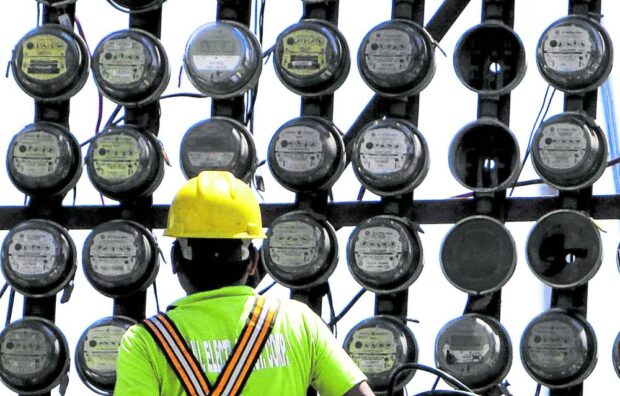Senator hits power oversupply contracts

AT PEOPLE’S ACCOUNT | A lineman inspects electric meters in Metro Manila as the country continues to suffer from inequities in the country’s power industry. (FILE PHOTO)
MANILA, Philippines — The Energy Regulatory Commission (ERC) should impose penalties and file appropriate criminal charges against electricity distributors that supposedly “over-contract” power supply that is ultimately paid by consumers, Sen. Sherwin Gatchalian said on Sunday.
Gatchalian, who formerly headed the Senate energy committee, said they discovered this modus of some unscrupulous power utilities during a recent hearing on the questionable pricing system of certain electric cooperatives.
Over-contracting refers to the practice of power distributors, including electric cooperatives, of purchasing more than the consumers’ electricity demand during a certain period.
For example, he said, a distributor may enter into a power supply agreement (PSA) with an energy producer for 1,500 megawatts (MW) of electricity even if the requirement was just for 1,000 MW.
“The consumers will then be charged for that [over-contracting] of 500 MW of electricity,” Gatchalian said in a radio interview.
Article continues after this advertisement“That’s why I am calling on the ERC to review all the existing [power] contracts and order distribution utilities involved in over-contracting to pay fines because the consumers are being disadvantaged,” he said.
Article continues after this advertisementThe directors and officials of electric cooperatives and distribution utilities must also be reminded that it is illegal for them to engage in such practice, according to the senator.
“And if there’s corruption involved, criminal charges should be filed against them,” Gatchalian said.
In addition, he said the ERC should examine the PSAs that it recently disapproved as he suspected that some of these contracts involved over-contracting and over-charging.
Sufficient power supply
Meanwhile, Gatchalian said he was optimistic that the country would not experience red and yellow alerts this year as the National Grid Corp. of the Philippines (NGCP) had assured them that it had enough reserve energy to compensate for the possible drop in power production and spike in energy consumption.
The ERC and the Department of Energy required the NGCP to have a reserve power supply of almost 600 MW, he said.
“So whatever happens,” Gatchalian said, “that 600 MW will be available. That’s why I’m confident that we will not have yellow alerts and red alerts this time.”